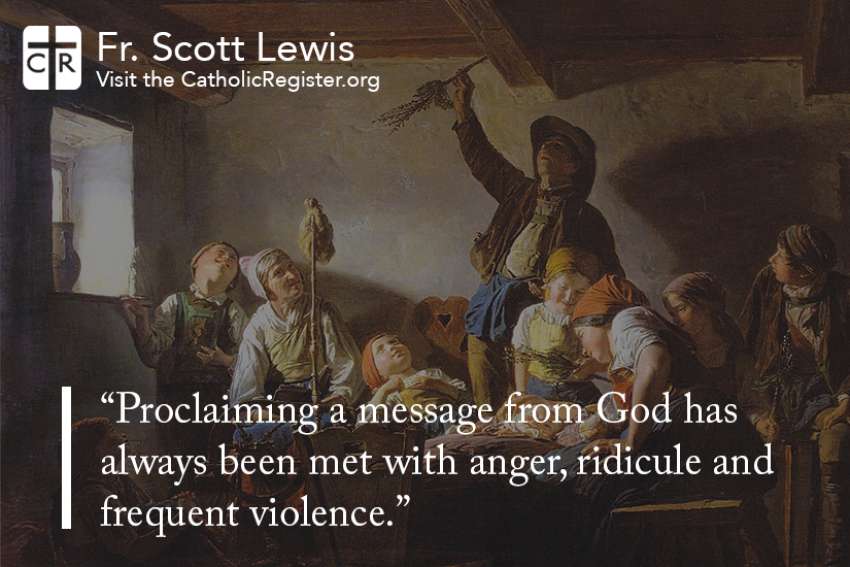Being God’s spokesperson or prophet was never an enviable task. In fact, most of the Old Testament prophets resisted God’s call vigorously. Jonah even ran in the opposite direction.
It is easy to see why — proclaiming a message from God has always been met with anger, ridicule and frequent violence. The Suffering Servant experienced this and he (if in fact the servant was one person) did not resist or run.
Even though he suffered humiliation and physical violence, he stood his ground and set his face like flint to the opposition. He drew his strength and inspiration from his close relationship with God. It appears he was overshadowed by God’s Spirit for he received instruction from above.
The Servant knew how to be silent and listen to the divine instruction that came to him each morning. His ear — meaning his mind and heart — was open to whatever the Lord said.
Authentic prophetic speech is never about one’s own opinions, ideas, prejudices, fears or likes and dislikes. Prophecy is not a platform for imposing one’s own will or point of view. Some prophets were shocked and not very happy about the message that they were commanded to proclaim.
The early Christian communities view Jesus through the lenses of Israel’s history, traditions and Scripture. Although the original passages in Isaiah probably referred to an unnamed contemporary or to Israel itself, they quickly gave the image a second life by making a connection between the Suffering Servant and Jesus of Nazareth. Indeed, His close relationship with the Father and His unwavering fortitude in the face of suffering made this association very easy.
The words prophet and prophetic are tossed about rather loosely today. It seems to denote anyone who is loud or angry about something. True prophecy is the fruit of humble prayer, a compassionate heart and meeting God in the silence.
A true prophet is always willing to pay his or her dues, suffer the consequences of the mission and does not revel in the status of victim. Most of all, the words of the prophet should always give hope and courage to the brokenhearted, oppressed and wavering.
The beautiful hymn from Philippians could be part of the prophet’s job description. Jesus withheld absolutely nothing. He gave away divine status and power, taking on the lowest, weakest and most vulnerable status of all — a human being, and one in the form of a slave. His obedience and steadfastness in the face of suffering led to His death. It was this fidelity and obedience that exalted Him over all.
Suffering and steadfastness in obedience to a spiritual ideal, when it truly comes from God, is the source of great transformative power. This guiding life principle is an antidote for the poisonous selfishness and tribalism that afflicts our world.
None of the four Passion accounts is appealing, but Mark’s is the grimmest of all. Jesus spoke continually about His impending arrest and death in Jerusalem and He insisted that whoever wanted to be His disciple should be willing to following in His footsteps.
Throughout Mark’s Gospel, Jesus is portrayed as the one misunderstood, rejected and let down by all. His disciples fled in terror from the garden; Jesus died a lonely death on the cross seemingly even abandoned by God.
On one level, the Passion narrative is a very depressing story. It is filled with human cowardice, greed, ignorance, cruelty and betrayal. Fear and hatred seemed to reign unchallenged. If the resurrection had not taken place, it would have been just another blood-stained but insignificant page in human history.
If we look at the narrative again, however, there are moments of real light that hint at the revolution to come. Before His Passion, an unnamed woman, in a great act of love and kindness, braved ridicule by anointing the feet of Jesus with costly ointment.
At the Last Supper, Jesus was concerned for His disciples and all those who would follow in future generations. In the Eucharist, he provided a way in which we can be united to one another and to Jesus in humility, gratitude, love and commitment to service.
But most of all, Jesus left us a roadmap for our collective journey towards God: a vivid example of love, generosity, self-giving and obedience. We now know how far selfless love should and can go.
God's word on Sunday: A true prophet is willing to pay a steep price
By Fr. Scott Lewis, S.JPassion (Palm) Sunday, March 25 (Year B) Isaiah 50:4-7; Psalm 22; Philippians 2:6-11; Mark 14:1-15:47
Tagged under:


